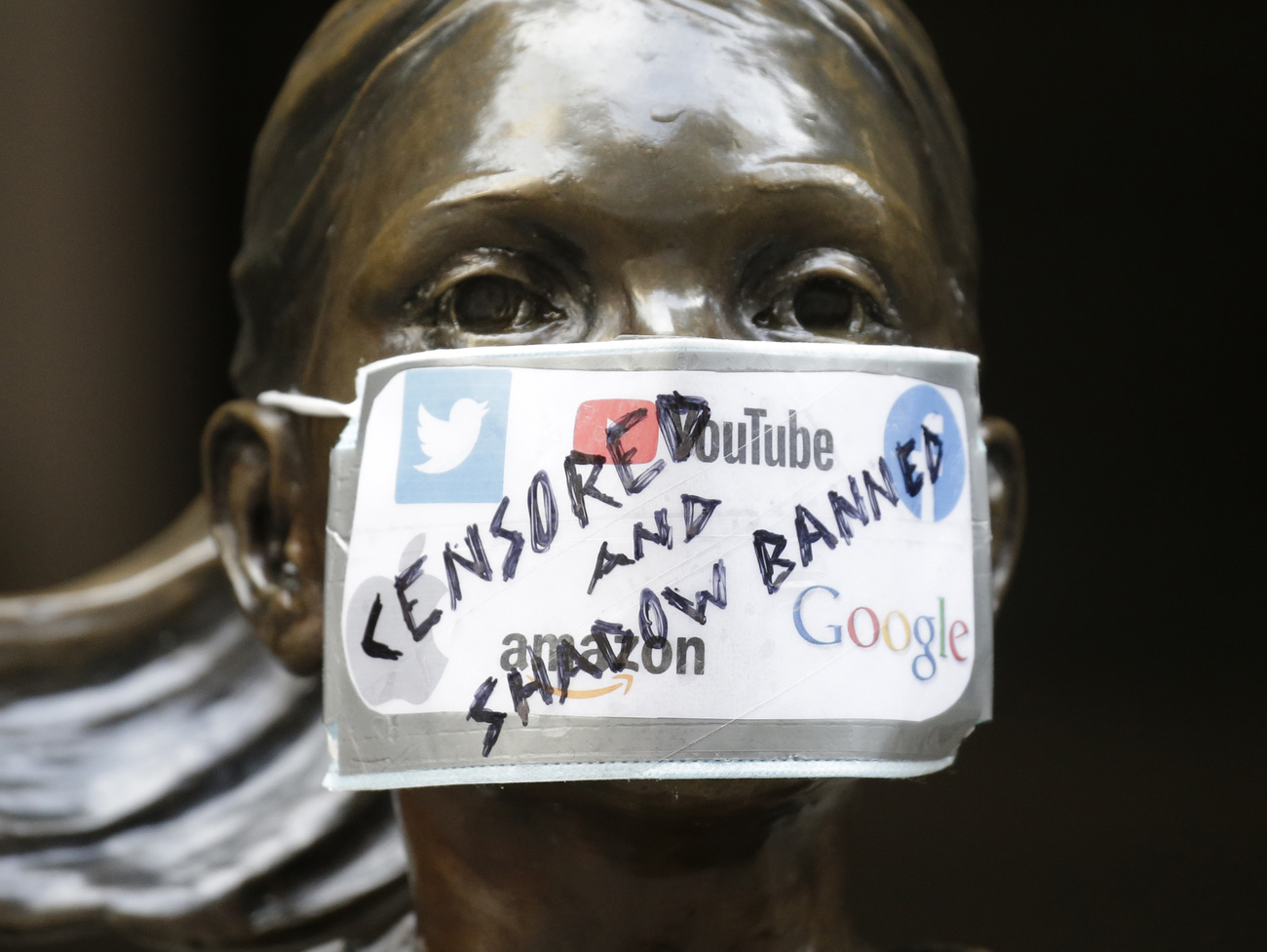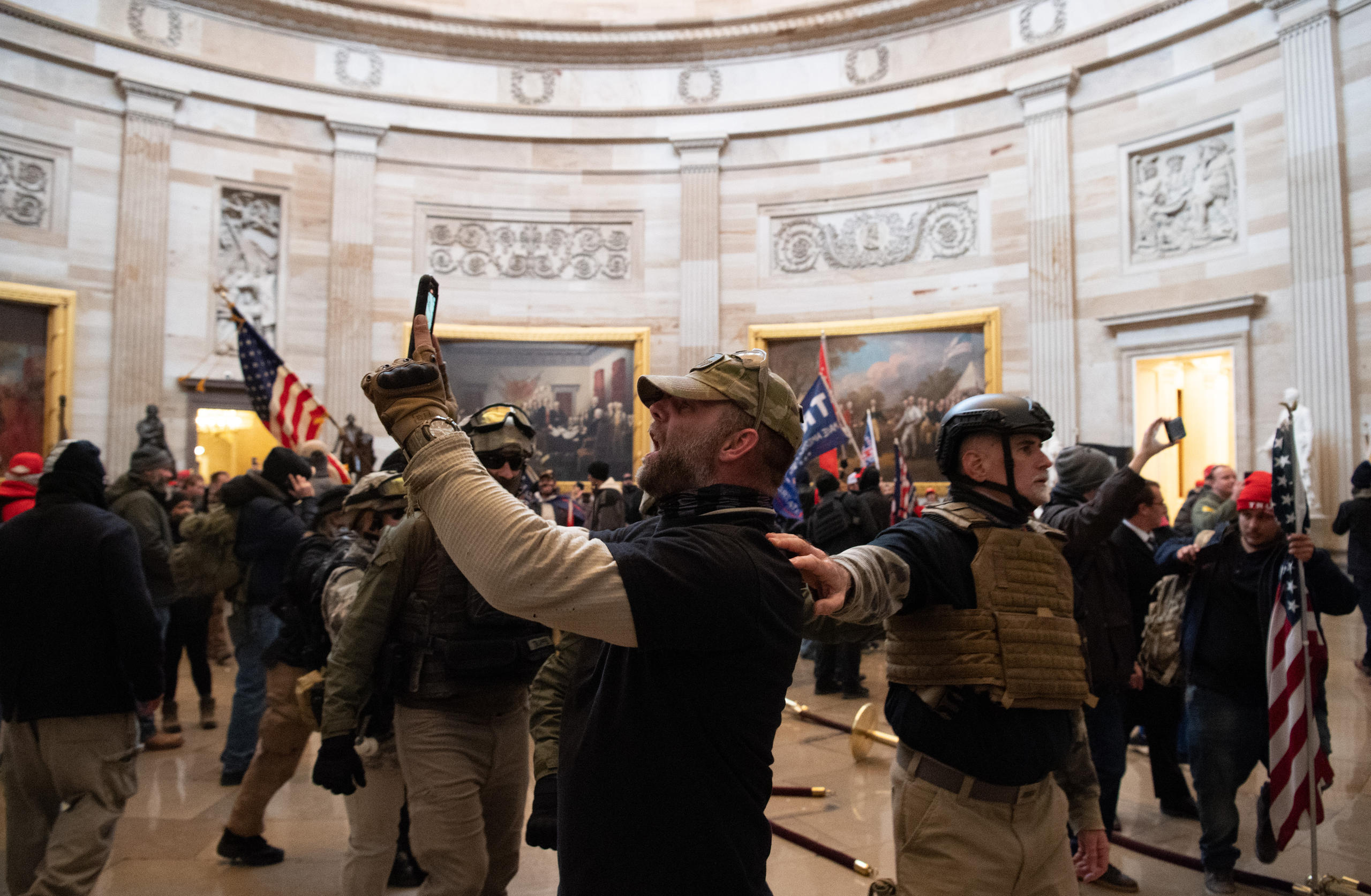Who gets to control the freedom of expression?

After the storming of the US Capitol in January and the banning of former President Trump by several social media platforms, debate has flared about the democratic role of Big Tech firms. How are authorities in the US, Europe, and Switzerland reacting?
The blocking of Donald Trump’s social media accounts by Twitter, Facebook and YouTube last month made it clear that control over the freedom of expression has become a major question of power.
Nothing less than the future of democracy is at stake, according to Dirk Helbing, a professor of computational social science at the Federal Institute of Technology ETH Zurich, in the aftermath of the Capitol riots in January.
“If pluralistic civil society doesn’t gain the upper hand, then democracy is over. We have to solve our problems through competing ideas, not with violence or totalitarian measures,” he wrote in the Swiss online magazine persoenlich.comExternal link.

More
How Switzerland has responded to online disinformation
Pandora’s box
In 1996, the US Congress approved an addition to the First Amendment of the country’s constitution, which guarantees freedom of opinion. Section 230 of the Communications Decency Act grants immunity to big tech companies for content which users publish on their platforms; in short, it exempts them from liability.
The decision opened a Pandora’s box of content of all kinds to be published – unchecked – online, says political scientist Adrienne Fichter, a specialist in internet policy and regulation.
Does the key to solving this now lie in either changing or scrapping the free ride?
Stephen Hill, an American author and the former director of the Center for Humane Technology thinks so. “It is time to start afresh”, he wrote last month in an essayExternal link for the online publication Zocalo Public Square.
- The “privatisation of democracy”: in liberal democracies, control of the freedom of opinion remains to a large extent with private tech firms
- The power factor: what happens on online platforms has consequences in the real world.
- Coasting: tech companies operate globally, but without global regulation.
- David versus Goliath: states that try to regulate the giants have to do it on their own.
- Surveillance capitalism: private tech companies have no stake in democracy and the freedom of opinion. Their only interest is in user data and advertising revenue.
- Gaining the upper hand: States must set down the rules in this competition. Otherwise, the news and information system that serves as the lifeblood of democracy will be completely derailed and used or abused for other purposes.
Even if Congress were to abolish this “obscure law,” it wouldn’t be a perfect solution, Hill argues. “It would make Big Tech media more responsible, more reflective and potentially also liable for the worst of their toxic content, including illegal content such as child pornography.”

Hill has appealed to the US government to take a hard line with digital companies, as it has in the past with telecommunications, railway and energy companies. He’s calling for the following concrete steps:
- The business activities of Facebook and others should be linked to a digital licence defining clear rules and regulations.
- Tech firms must first ask users before they collect any data.
- The oligopoly of the tech giants should be broken up into much smaller networks.
This fragmentation of power is where Marietje Schaake also sees a need for action.
“The tech companies are too powerful, especially the handful of huge players that operate social media platforms and search engines,” said Schaake, who is president of the Cyber Peace Institute in Geneva and director of international policy at Stanford University’s Cyber Policy Center.
“They are not only in a position to influence masses of consumers, but also masses of voters,” Schaake said. “This power needs to be addressed.”
Schaake favours regulation similar to that applied to the banking, pharmaceutical or auto industries.
“On the one hand, the companies need clear obligations and standards,” she said. “On the other hand, watchdogs and regulatory authorities have to be in a position to impose serious sanctions in the case of violations. These authorities must have both expertise and power, as well as the capacity to implement measures and investigate what is happening.”

More
‘Disturbing, shocking, historic’: Swiss papers react to US Capitol riot
A holistic approach
Clare Wardle of First Draft, a global initiative against disinformation, doesn’t believe that simply scrapping the liability exemption for tech firms is the right approach.
“Without this protection, platforms might be forced to remove both true and false information,” Wardle said. “Instead of concentrating on removing false information, we should think harder about why people publish and disseminate it.”
Wardle believes the state should promote “a healthier news environment” by supporting local journalism. “Local news providers are dying out, so more and more people are flocking to social media to get their news there,” she said.
Wardle also thinks a solution at a global level is possible. “The UN has set standards for the freedom of expression which many platforms use to guide their activity. So a global mechanism for holding these businesses to account should be possible.”

More
The legal difficulties of online expression in Switzerland
European impetus
At the end of 2020, the European Commission, the executive arm of the European Union, proposed a Digital Services Act aimed at holding global tech firms to account. The basis for the regulation is that whatever is forbidden in the real world should also be forbidden in cyberspace.
Adrienne Fichter says that “the law would introduce a uniform course of action according to defined institutional procedures – with central contact points, binding deadlines and the option of taking legal action in national courts,” she said.
But, she adds, Google has already voiced bitter opposition to the plan.
The Swiss way
As is the case in most countries, the Swiss government has so far relied on self-regulation in the tech sector. But in Bern, too, things are moving.
“The federal administration is currently clarifying the extent to which a Swiss governance approach to online platforms is necessary and possible,” wrote the Federal Office of Communications (OFCOM) in response to a query from swissinfo.ch.
Based on a 2019 report, authorities are examining how far the use of artificial intelligence or algorithms by search engines or social media could influence public opinion and preferences. The report is not due to be published until the end of this year at the earliest, OFCOM says.
But the office did reveal this much: the report will not primarily examine how Swiss law might conform to EU regulations. It will look at a “Swiss governance approach”, OFCOM said.

In compliance with the JTI standards
More: SWI swissinfo.ch certified by the Journalism Trust Initiative



Join the conversation!